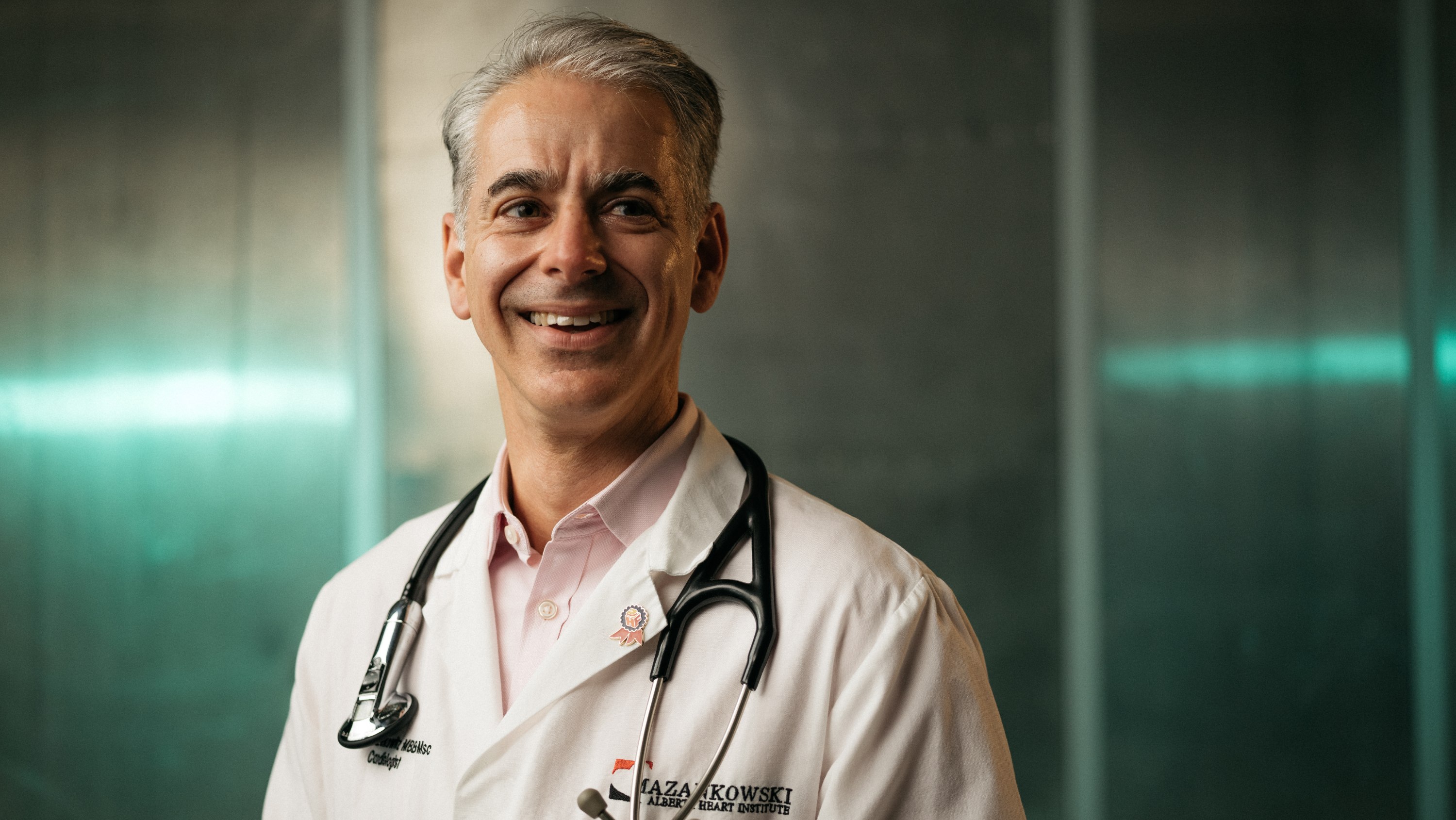Every day, dozens of hearts are captured across our province — that’s not a romantic metaphor, but a photographic fact.
Cardiac imaging is the cornerstone of diagnosing, treating and observing the progress of heart disease, says Justin Ezekowitz, director of cardiovascular research at the University of Alberta.
Heart disease is the second leading cause of death in Canada — one person dies every five minutes from heart conditions, stroke or vascular cognitive impairment. It’s also Canada’s most costly illness, totalling over $21 billion in medical and lost earning costs. Also, those numbers don’t account for the immeasurable loss in quality of life for many with heart disease.
Thankfully, the availability and quality of cardiac imaging have improved significantly over the last couple of decades. But those pictures hold untapped potential for patients, says Ezekowitz.
“We need to take a deeper dive into the images. [There’s] information buried in there that we haven't really appreciated or utilized.”
Now, thanks to the University Hospital Foundation (UHF), Ezekowitz and a multidisciplinary team of researchers are taking on this medical treasure hunt. This year, UHF granted nearly $1 million to the U of A’s Cardiovascular Research Institute, funding a three-year project that will harness the power of artificial intelligence to analyze cardiac images, as a tool for clinicians to more precisely diagnose and treat heart disease.
UHF is a longtime supporter of the university, donating more than $75 million to health-related research over the last 30 years. It’s part of their mission — to support innovative projects that translate directly into better health outcomes for Albertans, explains Jodi Abbott, UHF’s president and CEO.
“Cardiovascular disease already poses an immense health challenge to millions of Canadians. What the Cardiovascular Research Institute is undertaking is key to the discovery of new knowledge in cardiac diagnostics. We’re excited to provide funding to this project — the resulting clinical research could have immense, world-changing implications for patients,” she says.
While Ezekowitz and the research team had planned this project for some time, UHF transformed it from a longer-term aspiration to a present reality. “Their grant really made it possible. This idea can have a global impact,” he says.
AI prediction will improve patient health
The UHF funding supports three research goals: building a database of curated cardiac images, integrating AI into the database to identify patterns useful for treating heart disease and applying these findings back into the health-care system to support patients.
Thanks to connections with the U of A Hospital, the research team has already begun the steps towards privacy-compliant access to patient heart images from a variety of cardiac imaging technologies, including angiograms, echocardiograms, MRIs and CT scans.
“The U of A’s ties to the health system are integral. That’s unique in Alberta and certainly unique even in Canada. That sets us apart,” says Ezekowitz. “We're also a world leader at the university in all things AI — we have an incredibly talented group of people.”
This group, based in the cross-faculty Cardiovascular Research Institute, brings together the expertise of computer engineers, data scientists, biologists and clinicians, working collaboratively to build an “imaging core” — the database of patient images with built-in AI power. They will then program the AI to look for unique biological signatures buried in the images called “biomarkers.” The program will assign meaning to those markers and identify broader patterns that offer insight into more effective treatment of heart disease.
To explain, Ezekowitz likens this work to predicting the weather. Right now, if a doctor reviewed a cardiac MRI and diagnosed a problem, it would be like predicting with reasonable confidence that it will rain tomorrow in Edmonton. With AI looking at the same image, in the context of a whole database of images, it could predict exactly how likely it is to rain, at what time and in what specific neighbourhood. It’s about adopting a precision health approach tailored to each patient, he says.
Once the imaging core is built, the U of A researchers will channel their findings directly into Alberta’s health-care system. For example, if the AI can predict a rare heart condition based on a combination of biomarkers, they could then program echocardiogram machines to automatically detect that disease, explains Ezekowitz.
“Every time somebody's getting one of these pictures, they'd say, ‘Aha! You actually have this pattern — we should probably investigate further.’ That’s the goal with all screening tests, to introduce it in the most practical way, but also with the highest impact — which is always early on.”
Hope for heart health in Alberta — and beyond
Already, Albertans are contributing to this research. When a patient walks into the U of A Hospital to have their heart scanned, they are creating new knowledge that could positively affect not only their future, but their entire community, says Ezekowitz.
“Anytime we do health-care research, it pays dividends for the friends and family and other members of the community. But it also pays economic dividends. Science generates a return on investment that's quite substantial. There's a benefit to all Albertans in this type of endeavour — we are not just in the world of making individual patients better, but the population better as a whole.”
This kind of wide-reaching real-world impact aligns well with the goals of the University Hospital Foundation, says Abbott.
“We continuously seek out thought leadership that leads to solutions to health challenges that will bring us closer to better health and health outcomes,” she says. “We are excited to provide funding to this project and the immense, world-changing implications the resulting research could have for patient outcomes.”
Ultimately, the researchers hope to extend this work far beyond the province, sharing their AI-powered findings with other health-care professionals.
“If we can set it up correctly, it shouldn’t matter geographically where people are,” says Ezekowitz. “We should be able to create solutions that will help people in a much broader world. We’re in the first chapter.”
